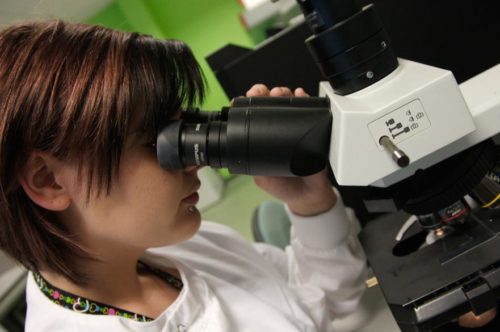Course overview
Key contributors to modern healthcare, biomedical scientists play a vital role in the diagnosis, prevention and treatment of disease, monitoring treatments and developing advanced diagnostic tools or novel therapeutic strategies.
- Both courses are accredited by the Institute of Biomedical Science (IBMS) and Applied Biomedical Science is also approved by the Health and Care Professions Council (HCPC).
- Well-equipped suite of analytical and biological laboratories where you can gain hands-on experience using industry-standard techniques.
- No.1 in the Midlands for career prospects in Biological Sciences in the Times Good University Guide 2021.
- Support applying for placements in laboratory and industrial settings to gain crucial real-world experience.
Why you should study this course
Accredited by the Institute of Biomedical Science (IBMS), the Biomedical Science and Applied Biomedical Science degrees integrate a broad range of biological disciplines to promote understanding of how the human body works and the biology of disease. Throughout the course you will gain practical experience in the laboratories based in our state-of-the-art Alison Gingell Building. Here you will learn and develop the key skills and techniques required for working in a laboratory.
To practice as a biomedical scientist, you must hold an IBMS accredited degree and also be registered with the Health and Care Professions Council (HCPC). Students are enrolled on Biomedical Science BSc (Hons) – those who undertake a 12-month placement between years two and three in an approved laboratory, and complete a training portfolio, are then transferred on to Applied Biomedical Science BSc (Hons) for the final year of study. The academic content of both courses is the same, however those on Applied Biomedical Science are eligible to apply for HCPC registration and biomedical scientist roles upon graduation (additional costs may apply).
Both the Biomedical Science and the Applied Biomedical Science courses explore the human body in health and disease, from the functioning of whole body systems down to cell and molecular processes. Course content provides a broad knowledge in the mechanisms, diagnosis and therapeutics of human disease with particular emphasis place on the specialist areas of biomedical science: clinical biochemistry, medical microbiology, cellular pathology, haematology, immunology and genetics.
Laboratory sessions are a fundamental component of the course and aim to help with the development of not only laboratory techniques, but also data interpretation and analysis. Within the lab you will have the opportunity to gain experience of techniques such as PCR, cell culture, flow cytometry, tissue staining, protein detection and microbial culture.
You’ll be taught by experienced academic staff who have a range of hospital and research laboratory experience, bringing their expertise into their teaching (please note staff are subject to change).
We benefit from extensive links with employers, such as the NHS, university research labs, public health laboratories and biotechnology companies where some of our previous graduates have found employment. We also focus on student-centred teaching in which you devise and carry out your own laboratory experiments so that you can demonstrate your ability to work independently and solve problems to future employers.
How you’ll learn
Your course will be a combination of online and campus-based sessions, which will include laboratory-based practical classes, workshops and lectures which will be delivered both on campus and online.
Our experienced teaching team includes staff with a variety of both research and industrial backgrounds including staff who are HCPC registered with interests and expertise in a wide range of disciplines which align to the course content (please note staff may be subject to change).
In a typical week, you will have around 18 contact hours of teaching which may include:
- Personal tutorial/small group teaching: You can also arrange to see staff in their ‘drop in’ sessions for any additional help you may need.
- Medium group teaching: practical classes or skills workshops
- Large group teaching: lectures
- Live online teaching
The contact hours will be made up of a combination of these different styles. You will also be expected to spend time each week on guided study which may include online activities and directed reading/preparation.
Assessment
A number of different assessments methods used throughout the course, these include time-restricted assessments such as tests, lab reports, presentations and posters.
The Coventry University Group assessment strategy ensures that our courses are fairly assessed and allows us to monitor student progression towards the achieving the intended learning outcomes. Assessments may include exams, individual assignments or group work elements.
Job ready
These professionally accredited degrees (please see the Accreditations and Professional Recognition section) aim to equip you with the appropriate knowledge and advanced laboratory skills to pursue laboratory careers in biological industries. Those who complete the Applied Biomedical Science BSc (Hons) can also become a Health Care Professional Council (HCPC) registered practitioner.
You will have the opportunity to gain hands-on experience using industry-standard techniques, which aim to help you stand out in the graduate job market.
International experience opportunities
Our sandwich degree option allows a work placement or study year, which can be taken abroad*. Some past students have undertaken fieldtrips to Malawi where they have educational engagement with groups of children participating in diverse community projects at local primary and nursery schools, assisted in monitoring the state of boreholes in rural villages, made sun dried bricks for building projects and climbing the challenging mount Mulanje.
Zobacz więcej na stronie uniwersytetu >>
Wiza studencka do Wielkiej Brytanii
Aby studiować w Wielkiej Brytanii potrzebujesz wizy studenckiej. Aby złożyć wniosek o taką wizę studencką musisz zdjać certyfikat językowy na poziomie B2.
Uważaj! Do celów wizowych musisz wybrać wyłącznie egzamin w wesji Secure English Language Test (SELT) UKVI .
Co to jest test SELT UK VI registration? Przeczytaj więcej o testach SELT UKVI >>




















